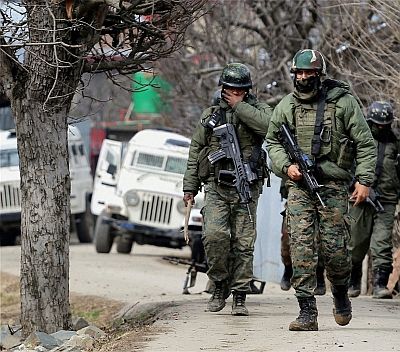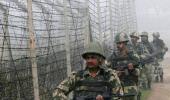 'By beheading an Indian soldier, the Pakistan army has demonstrated its proclivity for barbaric medievalism.'
'By beheading an Indian soldier, the Pakistan army has demonstrated its proclivity for barbaric medievalism.'
'The strategies adopted and the punishment inflicted by India must be made progressively more stringent with every new act of terrorism till the cost becomes prohibitive for Pakistan, says Brigadier Gurmeet Kanwal (retd).
In retaliation for India's surgical strikes that had been launched after the terrorist attack at Uri, the Pakistan army has been firing indiscriminately on the Line of Control and the international boundary sector south of Jammu.
Pakistani firing has resulted in the death of soldiers, Border Security Force personnel and eight to ten civilians, including women and children. A large number of civilians have also been injured, triggering a stream of refugees.
According to the BSF, 14 outposts of the Pakistan Rangers have been destroyed in retaliatory firing.
On the night of October 28, a soldier of the Sikh Regiment was martyred while patrolling near the LoC in the Machhil sector of north Kashmir. In all probability, he was hit by a bullet during an encounter and slipped downslope away from his comrades. When they discovered his body, they found that it had been horribly mutilated.
The Indian Army's Northern Command said in a statement that in retaliation for the brutal mutilation of the body of an Indian soldier, four Pakistani posts in the Keran sector had been razed to the ground in a massive fire assault and that heavy casualties had been inflicted on the Pakistan army.
This is not the first time that the Pakistan army and the terrorist organisations that it nurtures have demonstrated their proclivity for committing wanton acts of brutality in gross violation of the Geneva Conventions. Earlier, incidents of beheading had occurred on the LoC in 2008 and 2013.
During the Kargil conflict of 1999, the Pakistan army had mutilated the bodies of Lieutenant Saurabh Kalia and members of his patrol and had sought to blame it on the so-called Kashmiri freedom fighters.
Subsequently, in an act that was unprecedented in the annals of military history, the Pakistan army had refused to accept the dead bodies of its own regular soldiers belonging to the Northern Light Infantry.
Despite the logistical difficulties of organising mass funerals in a high altitude sector, all of the dead NLI soldiers were buried by the Indian Army with the honour due to a soldier who dies fighting for his country.
Records of the burial ceremonies were sought to be handed over to the Pakistan director general of military operations during the discussions at the Attari-Wagah border. He declined to accept them formally across the table, but took them privately.
Perhaps the Pakistan army had disowned its soldiers to keep up the pretence that it was not directly involved in the intrusions that it had engineered into the Kargil district of Jammu and Kashmir. However, its bluff was called as the Indian Army had incontrovertible documentary evidence of the involvement of soldiers of the NLI.
The evidence in the form of identity cards, personal letters, battalion and company attendance and leave registers and registers that had records of rations and supplies, was released to the media by the Indian director general of military intelligence. It was also shown to the military attaches posted at the high commissions and the embassies in New Delhi.
Soon the Pakistan army became infamous the world over as a rogue army. Its recent activities reveal that it has no desire to give up that dubious distinction.
The attacks sponsored by the Pakistan army at Pathankot, Gurdaspur, Udhampur, Pampore and Uri, among others, have provided conclusive evidence that it is not an organisation that learns from its own follies.
The post-Uri surgical strikes launched by India have exacerbated the perpetually ongoing civil-military divide in Pakistan.
Imran Khan, whose ambition far exceeds the number of seats his party holds in the Pakistani national assembly, had threatened to launch yet another anti-Nawaz Sharif agitation at Islamabad -- ostensibly with the army's backing --from November 2, which has now been called off.
And the prime minister is finding it difficult to appoint a new army chief to succeed General Raheel Sharif who retires this month but yearns for an extension.
Operation Zarb-e-Azb against the Tehreek-e-Taliban Pakistan in North Waziristan has dragged on for over two years without much success. Soft targets in Quetta and Peshawar have been repeatedly hit by major terrorist attacks.
Fissiparous tendencies, ethnic tensions and a weak economy continue to undermine Pakistan's socio-economic development. A senior United States policy analyst has described the situation as a 'slow motion implosion.'
General Kayani, Raheel Sharif's predecessor, had correctly identified the demons within as Pakistan's primary national security challenge. Kayani had underplayed the bogey of an existentialist threat from India. He had continued to support General Pervez Musharraf's strategy of holding peace negotiations with India and keeping the eastern front quiet while fighting the TTP on the western front.
However, Raheel Sharif, known as a 'thinking' general and the originator of the master plan to fight the TTP, has once again upped the ante against India -- with disastrous results for Pakistan.
It appears incomprehensible that an army that is besieged by almost insurmountable internal security challenges would act so irrationally -- knowing fully well that the end state would be to further destabilise the country.
So, have the generals who rule Pakistan from the back seat from GHQ, Rawalpindi, lost the plot?
Or are they capable of recognising that their strategy of pursuing unending hostility towards India in order to perpetuate their own power in Pakistan's polity has let down their country?
Reluctant recognition of the army's role in having impeded the nation's growth can be sensed among Pakistan's senior military veterans at Track-2 conferences. They are conscious of the fact that 70 years of hostility with India has yielded no dividends.
However, the early contours of the possibility of a change of heart at the strategic level are difficult to discern among Pakistan's serving generals.
Hence, the only conclusion that can possibly be drawn is that Pakistan's Deep State -- the army and the Inter Services Intelligence -- is unlikely to give up its strategy of bleeding India through a thousand cuts.
It will continue its attempts to destabilise India and Afghanistan through non-State terrorist organisations like the Lashkar-e-Tayiba and Jaish-e-Mohammed and the Haqanni network, all of whom the Deep State calls strategic assets.
The aim of India's counter-proxy war strategy should be to raise Pakistan's cost for waging a proxy war.
Since the attack at Uri, India has achieved limited success in isolating Pakistan internationally as a State-sponsor of terrorism. These efforts must continue, along with pro-active military and economic measures.
Carefully calibrated military measures should include artillery fire assaults, surgical strikes by the special forces, raids by border action teams and, if need be, air-to-ground strikes with precision-guided munitions fired from stand-off ranges.
Pro-active military measures should be supplemented by covert operations.
The strategies adopted and the punishment inflicted must be made progressively more stringent with every new act of terrorism sponsored by the Deep State till the cost becomes prohibitive for Pakistan.
The era of accepting a 'thousand cuts' must be given a burial once and for all.
Pro-active strategies can be implemented at the tactical level without compromising with strategic restraint.
Brigadier Gurmeet Kanwal (retd) is Distinguished Fellow, Institute for Defence Studies and Analyses, New Delhi.










